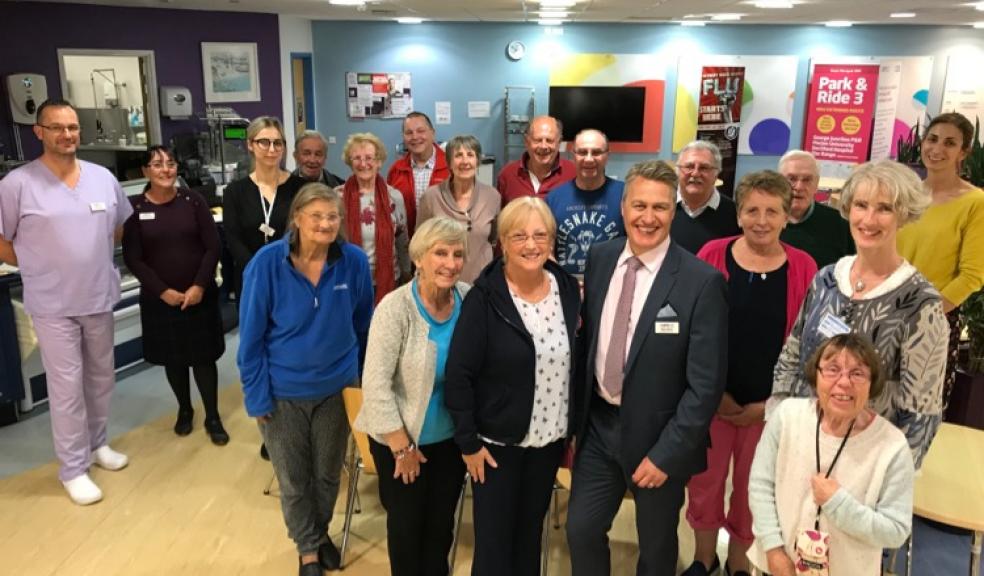
Bowel cancer event focuses on family links and endoscopy
Members of the Plymouth and District Bowel Cancer Support Group have visited Peninsula NHS Treatment Centre to find out more about family links to bowel cancer, and how endoscopy is used to help with early diagnosis of the condition.
Attendees were given a presentation by Dr Selina Goodman, a genetic counsellor from the University of Plymouth. Dr Goodman is the creator of Family Web (www.familyweb.org.uk) designed to enable families to share vital information about their genetic diagnosis with other family members and health professionals.
The idea formed when Dr Goodman heard of a young mother in her 30s who, having presented clear symptoms of bowel cancer, was told “not to worry” by her doctor. Had she been able to access information demonstrating her family history at the time, she would have been immediately referred for screening which would have shown that she, in fact, had an inherited form of bowel cancer.
Dr Goodman’s presentation covered the research she carried out which enabled her to create the website to meet the needs of people with an inherited vulnerability to bowel cancer. She said: “Family Web allows high-risk patients a secure platform to share information such as letters from the hospital or a family tree [demonstrating a history of bowel related disease] by a sending a link via email to their relatives. Users of the website can show their doctor crucial information about their diagnosis by turning on their smartphone, tablet or laptop and looking at their account on the website.”
She added: “I was very pleased to be given the opportunity to talk about my work with people who are so intimately associated with bowel cancer.”
Visitors then found out more about the endoscopy service at Peninsula NHS Treatment Centre. Around 2,700 endoscopies have been carried out at Peninsula since its endoscopy service was launched just over two years ago. Based in the first hospital of its kind to be rated as ‘Outstanding’ by the Care Quality Commission, the service is one of only a handful in the country to have been accredited by the Joint Advisory Group after that organisation’s first inspection (it is usual for services to have one or two further inspections before accreditation is granted).
Peninsula NHS Treatment Centre offers a range of endoscopy procedures including:
· Colonoscopy, used to examine your large and small bowel;
· Sigmoidoscopy, the examination of the large intestine using a rigid endoscope;
· Flexible sigmoidoscopy, where a flexible endoscope is used to look at the furthest part of the colon;
· Gastroscopy, where an endoscope is passed through the mouth and throat to check the stomach;
· Trans-nasal endoscopy, where a thinner endoscope is passed through the nose to investigate the stomach
If your GP thinks you need an endoscopy, you can ask to be referred to Peninsula NHS Treatment Centre – it is part of your choice for NHS treatment and care.
Visitors were then given a tour of the hospital.
Wendy Wilson, Founder and Chair of the Plymouth and District Bowel Cancer Support Group, commented: “We were very grateful to Peninsula NHS Treatment Centre for arranging this event. It was very helpful for our members, many of whom will be interacting with Dr Goodman’s website and choosing Peninsula for their endoscopy and other treatment.”
Mark White, Hospital Director at Peninsula NHS Treatment Centre, added: “We were delighted to welcome members of the Plymouth and District Bowel Cancer Support Group to the hospital, and our thanks go to Dr Goodman for her interesting and informative presentation. Bowel Cancer UK is one of our chosen charities, for which we have already raised in the region of £350 through donations.”
More information is available by visiting www.peninsulatreatmentcentre.nhs.uk
5 signs you may need an endoscopy
An endoscopy is when a tube with a camera is inserted into your body through your mouth, nose or anus to help identify and diagnose the cause of a variety of symptoms.
Why might you need an endoscopy? Here are five signs to look out for and to discuss with your GP:
Stomach pain – if you are experiencing pain in your abdomen which is unusual or which lasts for more than a few hours, it could be symptomatic of a worrying or serious condition. You should see your GP who may refer you for an endoscopy procedure to diagnose the cause of the problem
Blood in your stools – this may be the sign of an infection or bowel cancer, which if caught early can be treated. If you notice any blood in your stool or when you wipe yourself after going to the toilet you should see your GP who may suggest one of the endoscopy procedures described below
Difficulty swallowing – also called dysphagia, this can be caused by a number of conditions ranging from an infection to cancer of the oesophagus. If symptoms persist you should see your GP quickly and discuss with them if an endoscopy is required
Acid reflux/heartburn – we have all suffered heartburn at some point and antacids help, but if you are experiencing heartburn or acid reflux regularly or over a long period of time it may be caused by an underlying condition. Long term acid reflux can also lead to Barrett’s oesophagus, where the abnormal growth of cells causes blockages. If your experience of acid reflux or heartburn is long term it should be discussed with your GP who may refer you for an endoscopy to investigate the cause of the problem
Irregular bowel movements, long term constipation or diarrhoea – sometimes these symptoms can be caused by a change in diet or lifestyle and may settle, but if you experience them for a long period of time they may be signs of something more serious such as IBD, colon cancer or an underactive thyroid. Speak to your GP who may think it is appropriate for you to have an endoscopic investigation.
Whatever your symptoms, always speak to your GP if you’re worried.













